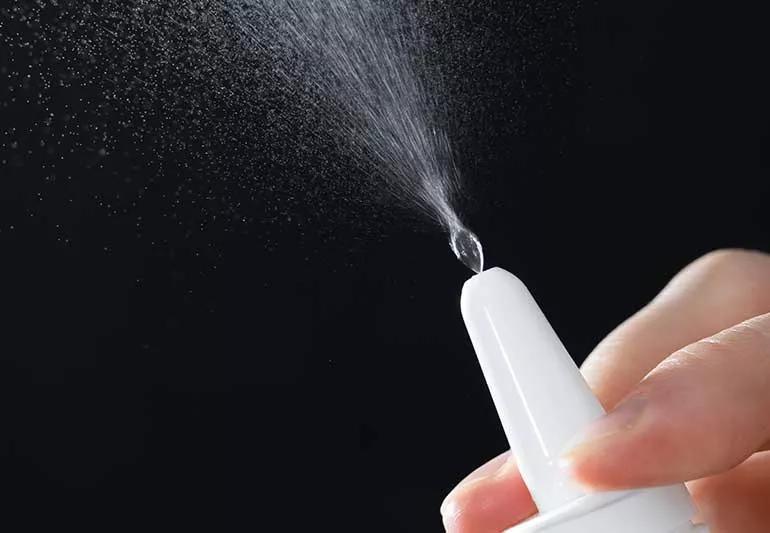‘Rebound congestion’ happens when your body starts to rely on decongestant nasal spray

Sniffle, sneeze, achoo! When you’re all stuffed up — whether from allergies, sinus congestion or a cold — it can sometimes be difficult to remember what it’s like to breathe through your nose. Nasal sprays can often help.
Advertisement
Cleveland Clinic is a non-profit academic medical center. Advertising on our site helps support our mission. We do not endorse non-Cleveland Clinic products or services. Policy
But if you’ve heard that you can become addicted to nasal sprays or experience the “rebound effect,” you may be feeling a little unsure about whether it’s safe to use one of these sprays at all.
Allergist Mark Aronica, MD, explains the differences between types of nasal sprays, including which ones can become habit-forming and which ones you actually should take every day.
“Rhinitis medicamentosa, or ‘rebound congestion,’ occurs when you overuse certain nasal sprays and your body develops a tolerance,” Dr. Aronica explains, “but it’s not quite as simple as that.”
There are a few different kinds of nasal sprays, and they should be used for different periods of time. In fact, some common types of nasal sprays used for allergy relief actually should be used daily — and those ones aren’t habit-forming.
If you have bad allergies (hay fever) or are dealing with a cold, your doctor may have suggested a nasal spray. Is it OK to take it every day? That depends on which kind you’re taking.
There are a few types of nasal sprays meant to treat allergy symptoms, and they’re all slightly different (more on that in a moment). But here’s what they have in common: They’re OK to take every day. In fact, they should be taken every day if you want to truly make a dent in your allergies.
Advertisement
Nasal steroid sprays reduce inflammation in your nasal passages. They’re available over the counter and work best when you start taking them a few weeks before allergy season begins (whichever season that may be for you). Types include:
Antihistamine sprays aren’t habit-forming, either. They include:
Saline nasal sprays moisten your nasal passages, which can flush out mucus, pollen and other irritants. They may be branded as “saline moisturizing spray” or “saline mist.”
“None of the three types of nasal sprays used for allergy symptoms — nasal steroid sprays, antihistamine sprays and saline sprays — is habit-forming,” Dr. Aronica confirms. “These sprays should be used regularly in order to alleviate allergy symptoms.”
If you’re dealing with allergies, ask your healthcare provider what kind of spray or other medication is right for you.
These are the nasal sprays you might turn to when you have a cold, the flu or a sinus infection — and they’re the ones that you shouldn’t use on a regular basis. They include:
“Decongestant sprays shouldn’t be used more than three or four days in a row,” Dr. Aronica states. “Any longer than that can cause you to build up a tolerance to them.”
Why? Let’s discuss.
You know the phrase, “Too much of a good thing”? Yeah, that’s decongestant sprays. When you use one of these sprays for more than a few days in a row, you can end up with “rebound congestion,” which is basically a vicious cycle of congestion — perpetuating your symptoms instead of relieving them.
When you’re sick and all stuffed up, decongestants narrow the blood vessels in your nose. This reduces inflammation and helps clear up your congestion, which makes you feel better. But if you use a decongestant spray for more than a few days, they start to become the problem instead of the solution.
“If you use a decongestant spray too much or too often, your body can become dependent on them,” Dr. Aronica explains. “Then, when you try to stop using the spray, your nasal passages start to swell up again, which causes your congestion to return. This can lead you to use nasal spray again in order to try to feel better.”
You see where this is going, right? It becomes a self-perpetuating cycle: You use a decongestant spray to clear up your symptoms, but if you use it too much, your body starts to rely on it — and then, your symptoms come back any time you don’t use it.
Advertisement
If your body has become dependent on a decongestant nasal spray, you won’t be able to shake those initial symptoms of congestion, like:
Importantly, though, you won’t experience other symptoms of allergies (like itchy eyes) or cold and flu (like sore throat, body aches, etc.). That’s because when you’re dealing with rebound congestion, the problem is the continued congestion itself.
If you’ve used a decongestant nasal spray for a couple days longer than recommended, you might be able to taper off use on your own. But often, the best thing to do is speak to a healthcare professional — especially if you’ve been using a decongestant nasal spray for weeks, months or even years.
“Abruptly stopping long-term decongestant spray use can make your symptoms worse, so it’s always safest to wean off under medical supervision,” Dr. Aronica advises. “Your provider will guide you, and they can recommend other treatments or non-habit-forming medications to ease your congestion.”
It’s important to remember that nasal spray is a medication — and like any medication, it should only be used as recommended, both in dosage (how much you use) and duration (how long you use it).
Advertisement
Avoid rebound congestion by following the label and not using a decongestant nasal spray for longer than the recommended amount of time (no more than five days).
“If you have prolonged congestion, it’s best to speak with your healthcare professional,” Dr. Aronica also advises. “They can help get to the root cause and recommend the right course of treatment to get you feeling better.”
Advertisement

Sign up for our Health Essentials emails for expert guidance on nutrition, fitness, sleep, skin care and more.
Learn more about our editorial process.
Advertisement

Time of day, time of year and weather patterns can all make your allergies worse

Find out how allergies work on your body

They can feel similar, but the differences matter — especially if you’re at higher risk for complications

‘Walking pneumonia’ is milder and doesn’t always require medication — but it’s also highly contagious

The little blue pill might help with physical arousal, but there are better treatments for low libido in women

Most antihistamines, like Zyrtec, are OK, but avoid decongestants for at least the first trimester

This diabetes medication can treat obesity, but it’s not for people who just want to drop a few pounds

They’re viral cousins, but enteroviruses are more likely to cause serious illness

Even small moments of time outdoors can help reduce stress, boost mood and restore a sense of calm

A correct prescription helps your eyes see clearly — but as natural changes occur, you may need stronger or different eyeglasses

Both are medical emergencies, but they are very distinct events with different causes